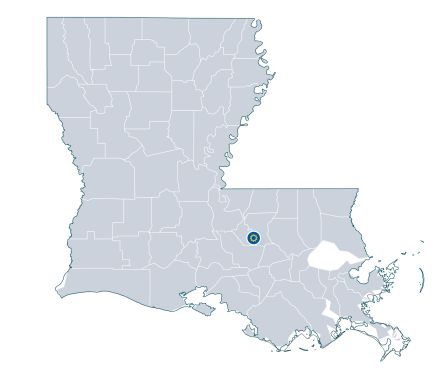The NSF Louisiana Energy Transition Engine (Louisiana) is led by Louisiana State University and spearheaded by a coalition named the Future Use of Energy in Louisiana (FUEL) that has the support of more than 53 partners that include business and industry, state and local agencies, and post-secondary institutions. This energy ecosystem aims to enable a clean energy expansion for the state by advancing research and commercialization efforts in the areas of carbon management, the use of hydrogen as an alternative fuel, carbon dioxide as a feedstock and sustainable water and sustainable manufacturing for clean energy to promote pathways to decarbonization across Louisiana.
Addressing a critical U.S. need: Louisiana is currently a global leader in energy production and petrochemical manufacturing due to the strong presence of the hydrocarbon industry in the state. Louisiana has decreased emissions of CO2 at a rate similar to the overall U.S. economy (-13% versus -15.8% since 2000). The U.S. is among the few major energy exporting countries that have reduced CO2 emissions since 2010. The challenge in Louisiana and the U.S. as a whole is how to maintain this competitive advantage in a changing global energy market that increasingly favors suppliers that are able to better manage and lower carbon emissions. Because of this challenge, researchers, industry partners and public sector partners in the state are driving transformative efforts to enable an energy expansion for the state, while the nation and world work to meet aggressive goals to increase energy utilization while managing carbon emissions. This NSF Engine has identified critical research and development topic areas that must be advanced to drive clean energy innovations and get closer to a net-zero carbon future. It will pursue those goals while cultivating an innovative ecosystem of tech companies that support the nation's expansion for energy, while also driving economic growth through job creation and training opportunities in the clean energy sector.
Year 1 impacts:
- Accelerating innovation. The NSF Engine is working with Startup Prize to create an Energy Startup Prize designed to catalyze energy innovation startups through education, networking, consulting and expert assessment. One recent pitch compeition winner, Encore CO2, is developing an electrolyzer technology that recycles CO2 to create carbon-based products like liquid fuels, polymers and proteins. One NSF Engine partner, Nicholls State University, has researchers working with industry partner PalmStar Energy to investigate the anaerobic digestion of sugarcane bagasse, a common agricultural residue in Louisiana, to produce hydrogen and methane. And another partner university, Louisiana Tech University, is working with Gramblingand BB&M LLC to develop low-carbon geopolymers as an alternative to cement for oil and gas wells.
- Attracting additional Investment: In support of the NSF Engine, Louisiana Economic Development has agreed to provide a match to the federal grant awarded to LSU, up to $67.5 million. This investment will help create new jobs, new businesses and other support activities in the energy sector, as well as generate spin-off jobs and service companies in the sector. This array of jobs will help Louisiana's energy workforce, allowing workers to increase their skill levels and earnings. This investment will help facilitate the academic partners ability to prepare students to become leaders and entrepreneurs ready to contribute to the success of Louisiana businesses.
- Building partnerships: The NSF Engine is partnering with Southern University, the Louisiana Chamber of Commerce Foundation, the Greater Baton Rouge Industrial Alliance and the Louisiana National Guard and Veterans Affairs to launch a series of quarterly community engagement meetings targeted for service members, faith leaders and industry workers. These meetings will inform stakeholders regarding trends in the energy sector and startup support to help small businesses engage in the sector.
- Expanding and training the future workforce. ExxonMobil is expanding the STEM Energy Professional Development program to rural school districts in Southwest Louisiana. The Louisiana Department of Energy and Natural Resources and Louisiana Arts and Science Museum are partnering to host Kids' Energy Day and a free summer teachers' workshop for fourth and fifth-grade public school teachers to increase energy literacy in Louisiana classrooms.
- Growing the local economy: The NSF Louisiana Engine awarded nearly $900,000 in proof-of-concept investments to Louisiana-based companies and researchers. This investment provides capital to early-stage companies using non-diluted funds that position them to receive professional funding to accelerate success.
Additional information
Lead organization: Louisiana State University.
Region of service: Louisiana (entire state).
NSF award: NSF-2315727
| Key technology areas |
|---|
| Advanced energy and industrial efficiency technologies, advanced materials, artificial intelligence, disaster prevention and mitigation, robotics and advanced manufacturing. |



